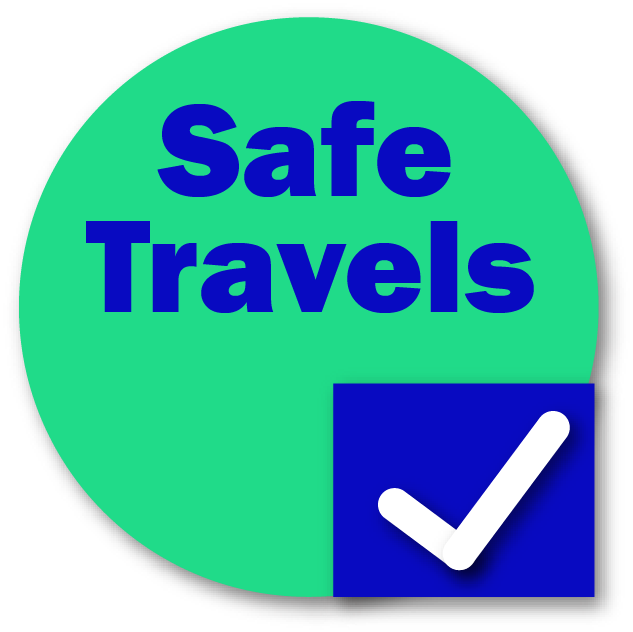



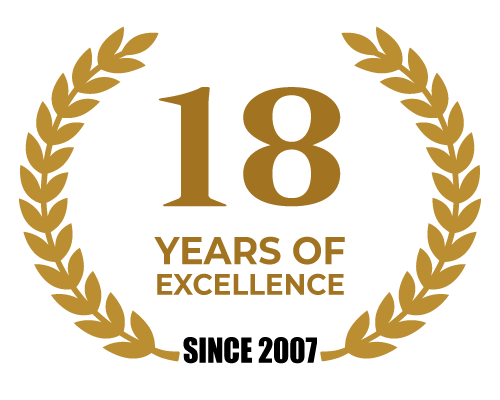
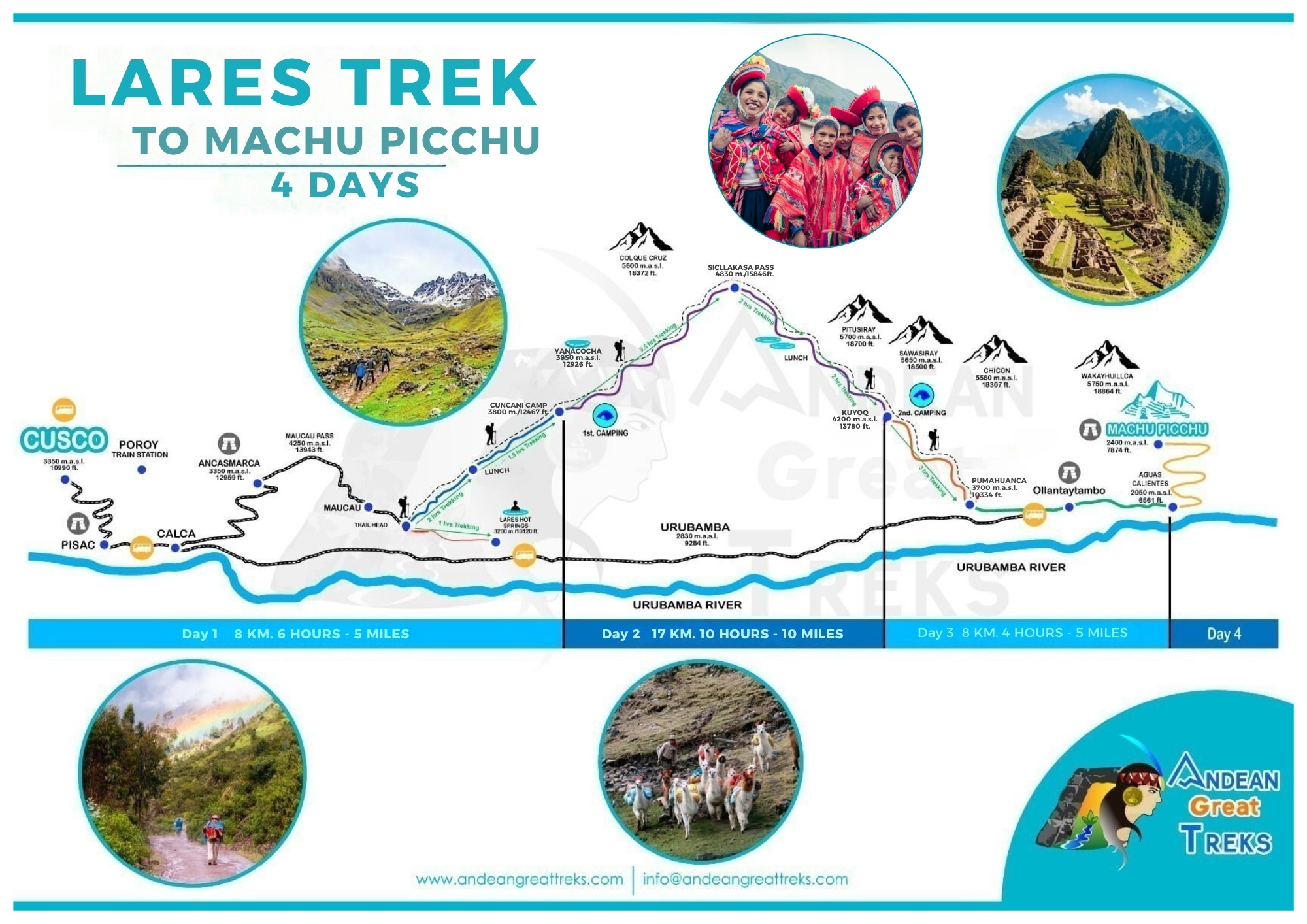 trip overview
included
Trip Highlights
activities
accommodations
itinerary
packing list
faq
essential trip information
best season to travel
price & availability
reviews
Reserve Online
trip overview
included
Trip Highlights
activities
accommodations
itinerary
packing list
faq
essential trip information
best season to travel
price & availability
reviews
Reserve Online
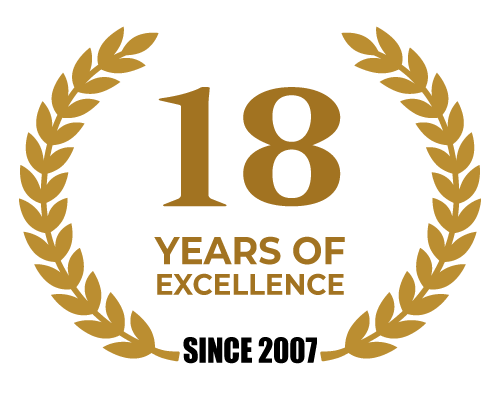 CREATING AUTHENTIC TOURS IN PERU
CREATING AUTHENTIC TOURS IN PERU

Lares Trek to Machu Picchu. It is placed on the mountain rage of Urubamba (on the east) crossing part of Sacred Valley.The Lares trek route crosses typical zones from the mountains of Peru.This tour combines the best of the Andean traditions and original indigenous villages. Valley of Lares takes you truly to remote locations and unknown destinations. This trip takes you to the heart of the Andes where few tourist have ventured, mountain forests and dense fog, millenary stone steps and all the time enjoying majestic views.
Embark on an incredible Cusco Andean exploration through Lares trek with a taste of the iconic Incas Culture. Take a guided tour through the Sacred Valley of the Incas, stopping at a women’s weaving in Calca, before beginning your hike. The Lares Trek might not be as touristy but it’s no less breathtaking with scenic views of lagoons, the snow-capped mountains of Chicon,Sawasiray, Pitusiray, andean flora, and opportunities to meet local Quechua people along the way.
The Lares Trek to Machu Picchu has two hiking levels, Vigorous (the first two days will be challenging) and Moderate hikes, participants should be able to hike 3–6 hours (up to 8 miles) without major discomfort over terrain with some steep grades. For vigorous hikes, participants should be strong hikers in excellent shape and able to hike 6–8 hours (5–10 miles) on trails with steep ascents and descents. Much of the trip is between 11,000’–15,000’ in elevation, making activity more challenging.
We highly recommend a conditioning regimen consisting of activities such as hiking, jogging, stair climbing or cycling beginning several months prior to departure to get in shape for the adventure. The better shape you are in, the more you will enjoy all this trip has to offer.
The first two days will be a very steep terrain with little oxygen, and very cold temperatures. The third and fourth day is the tour by bus, train and short walks.
Our guide will pick you up from your hotel in Cusco at 4:00 a.m. We will then travel in our private transportation toward the Sacred Valley of the Incas. We will make a brief stop in the village of Calca for breakfast and to purchase some items for the children we will encounter along the trek. We will then continue to the village of Lares, crossing the Amparaes Pass (4,500 m/14,764 ft) for another 2 hours and 30 minutes. Upon arriving at the trailhead, we will meet our muleteer and horses.
Once we reach the Lares hot springs, you will have the option to relax in the warm and therapeutic hot springs. These natural, mineral-rich pools are known for their therapeutic properties, perfect for relieving stress and preparing the body for the hike. After lunch, with renewed energy, we will begin our hike to Cuncani (3,900 m above sea level), our first campsite. The trek lasts approximately four hours, crossing valleys, mountains, and small high Andean villages. During the journey, we will observe local people going about their daily lives, wearing their traditional, vibrantly colored clothing and practicing ancient weaving techniques. We will also have the opportunity to see llamas and alpacas, emblematic animals of the Peruvian Andes, grazing in their natural habitat.
Upon arrival at the Cuncani campsite, our team will welcome you, and you will have time to rest and warm up before tea time. At this campsite, we will spend some time chatting with local children dressed elegantly in vibrant colors. The people are charming and welcoming. There you will have the opportunity to give them the gifts you have brought and also to purchase some of their handicrafts made from alpaca fiber. Later, we will enjoy our freshly prepared dinner, followed by a briefing for the second day.
Accommodation: Confortable Camping Tents
Included Activities:
Meals Included:
Today we wake up at 6:00 am with a cup of coca leaf tea. After a hearty breakfast, we begin our hike to the Sicllakasa Pass (4,780 masl/15,977 ft), with panoramic views of Chicón, San Juan, and Verónica mountains. This ascent will take four hours along a path with stone stairs. In some places, there are zigzag curves leading to the pass. Nearby, there are several piles of stones, which the locals call “Apachetas.” These are usually made by travelers who have passed through the pass as a symbol of gratitude and respect to the Apus (sacred mountains). Once we reach the pass, we honor the mountains with coca leaves, as is the local custom.
Enjoy the breathtaking views of parts of Moray, Maras, and Salineras. We then prepare for a two-hour descent along an Inca-era stone path, offering a beautiful view of the Sacred Valley. Today we will have lunch at the Pacchayoq site, which is surrounded by gigantic granite boulders and Queuña forests, considered the highest forests in the world. After lunch, we walk for another two hours, mostly downhill, and along the way, we will meet some local farmers in colorful clothing, as is traditional in all the villages surrounding the Lares Valley. We will enjoy stunning views of landscapes, snow-capped mountains, and herds of llamas and alpacas. Tonight we will sleep at a camp called Sutoq (4,100 m/13,451 ft), where we will have afternoon tea followed by a delicious dinner.
Accommodation: Confortable Camping Tents
Included Activities:
Meals Included:
After breakfast, we will hike downhill for 3 to 4 hours through the upper Pumahuanca Valley, passing numerous native Queuña trees, toward the village of Pumahuanca, located in the Sacred Valley at 2,950 m (9,678 ft). As we descend, we will observe the changes in flora, fauna, and temperature, and we will pass through magnificent forests of Chachacomo, Intimpas, and Lambran. Our guide will explain in detail the use of many plants in these areas as part of natural medicine. After two hours, we will arrive at the ruins of Inka Kancha, which was used as a control center for travelers. It is important to mention that the Lares Trail is not a highly commercialized trekking route, so you will be able to experience the peace of the place, as it is unlikely that you will encounter other travelers in our surroundings, as is typical on the Salkantay or Inca Trail. Upon arriving at the lunch spot, our cook will prepare our last lunch. After lunch, we will bid farewell to our cook and muleteers. Immediately following this farewell ceremony, we will settle in and admire the scenery for 30 minutes from the comfort of a private vehicle to the Ollantaytambo train station. Once at the station, we will board the 4:36 p.m. Inka Rail train to the town of Aguas Calientes; this journey takes 1 hour and 45 minutes. Upon arriving in town, we will walk to our hotel and check in. Later, we will have dinner at one of the local restaurants.
Accommodation: Hotel in Aguas Calientes
Included Activities:
Meals Included:
This day is one of the most important as you will have the opportunity to visit the fabulous temples and sacred sites of the Incas. You should get up at 5:00 am, and then take the bus from Aguas Calientes to Machu Picchu at 5:30 am. Our Machu Picchu tickets are authorized to enter the first time 6:00 am; Within the citadel you will have a guided tour of the most important sites for an hour and a half, then you can stay a little longer and explore on your own. Since the Machu Picchu ticket is valid only for one use, if a person goes out to use the hygienic services for example, he will not be able to re-enter the sanctuary, we recommend going down to the town of Aguas Calientes at 11:00 am, since that the 5 hours inside Machu Picchu are enough to know and take all the possible photos. The return train is scheduled at 14:30 pm, bound for the Ollantaytambo station, this trip takes approximately 1h 45m. Then you will be picked up by our condutor and will be arriving at your hotel in the city of Cusco at 18:45 pm approx.
Included Activities:
Meals Included: Breakfast
When packing for your Lares trek, you should keep in mind that it is best to dress in layers due to the weather variation. The variety of clothes that you must pack to dress in layers is key to your walk, from the morning when it is quite cold until mid afternoon when the temperatures rise and reach their peak and then freeze again at night. Stratification is also useful as you ascend high passages that are exposed to winds or descend into shady valleys.
Effective stratification only works if each layer allows moisture to pass and escape into the external environment. In fact, the best layered clothing, such as wool, promotes moisture transfer through its absorbent properties. Cotton and denim absorb moisture and, therefore, should be avoided.
 warm jackets
warm jackets
 Hydration bladder
Hydration bladder
 wool socks
wool socks
 camera
camera
 scarf
scarf
 first aid kit
first aid kit
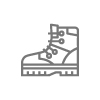 hiking shoes
hiking shoes
 Dry bags
Dry bags
 Trekking Poles
Trekking Poles
 sun cream
sun cream
 Snack
Snack
 sun hat
sun hat
 bathing suite
bathing suite
 rain coat
rain coat
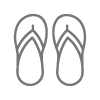 Sandals
Sandals
 insect repellent
insect repellent
 Passport
Passport
 Down Jackets
Down Jackets
 toilet paper
toilet paper
 daypack
daypack
 Wool cap
Wool cap
 head lamp
head lamp
 gloves
gloves
 sun glasses
sun glasses
 cap
cap
 extra cash
extra cash
 Trekking pants
Trekking pants
Lares trek is not a little known route. But, it comes to captivate every visitor. During the tour you will be able to appreciate natural wonders; like waterfalls, rivers, beautiful landscapes, thermal medicinal waters and snow-capped mountains; as well as, you can find cultural attractions.
The Lares trek 4 days and 3 nights, is a trek that you should not miss, one of its main reasons is the diversity of attractions that you will be able to appreciate during the 4 days, thus being the fourth day one of the most anticipated, since that this day you will visit one of the wonders of the world, Machu Picchu!
Lares Trek is located to the north of the city of Cusco, about 98 kilometers by road (almost 3 hours 30 minutes by car).
Lares village is also 45 kilometers from the town of Calca, the most important in its vicinity, which also offers tourist attractions to visitors. Geographically the town of Lares is 3,150 meters above sea level.
Lares is one of the eight districts that make up the province of Calca in Cusco. It has an Andean geography with beautiful landscapes and close to lagoons and snow-capped mountains. Its main tourist attractions are its thermal baths and the hiking route known as the ‘Lares trek to Machu Picchu’ (4-day route).
The town has a total area of 74,467 square kilometers. According to statistics taken in 2017, it has 5,743 inhabitants. The town is located in a small valley surrounded by the high snow-capped mountains: Sihuasiray, Chicón, Sirihuani and Capacsaya.
In the Inca era, according to Martin de Murua in his work “History of the Incas”, he states that before the arrival of the founders of the Inca empire, the Cusco valley was inhabited by three partialities; The Laris, Poqes and Huallas; that they were people of low and poor social status who had dominated the entire area that now constitutes the province of Calca; these were belligerent tribes that integrated the communities that inhabited these fertile valleys. Thus, the Laris would have formed the Lares culture in what is now the Lares district, and the Hamp’as would later become the current Amaparaes community.
With the expansion of the Inca Empire, this very productive valley was conquered by the Inca Wiraqocha, who dedicated great importance to these lands, so he built an Inca capital in the city of Calca, from where he controlled the production of fruits, coca leaf , and maiz.
The Lares district previously seems that the capital or center of the Lares culture has not been the current capital of the district because in it there is no trace of ancient cultures, nor in the urban conformation that is completely Spanish, nor in the walls and foundations of the buildings, it is thought that the center of the Lares culture was the population of Choquecancha, already displaced from the citadel of Antawala.
In the Colonial era (1535-1824), the entire area of Lares, therefore Choquekancha, was not exploited by the Spanish because it was located in a completely uneven terrain, they only maintained relations for the trade of some products.
In the Republican era (1824 to the present), the region acquires its greatest splendor as part of the Province of Calca, Department of Cusco, Lares acquires the category of District by virtue of the Law of October 22, 1,892, with its capital the current town of Lares.
Etymologically, the word “Lares” comes from that other word of Aymara origin “Laris” which means maternal uncle and sometimes, all relatives on the mother’s side.
During the route of “The Lares Trek” you will cross different altitudes from 4,800 meters above sea level, the highest point, this will be the second day of the walk and will descend to 2,050 meters above sea level, this being the last day.
The district of Lares has a geomorphology that generates different landscapes varied and microclimates. The southwestern area has characteristics associated with cloud forest, while to the north-west Andean characteristics. Regarding its physiography, it is varied with plains, hills, knolls and terraces.
The study area of Lares has very young geological formations, whose geological structure has the same initial process as the Sacred Valley of the Incas, for which it is named for a landscape of mountains, with rock structures assigned to the Permian. The outcropping rocks are sedimentary among them we have: shale, conglomerate limestone, quartzite, slate, metamorphic, phyllite; belonging to the Lower Paleozoic, “in Lares there is an abundance of epsomite, that is, magnesium sulfate (Ccollpa), used in dry cleaning; the most used are; cupric pyrite, iron carbonate and quartz, there is also porphyry, sandstone, feldspar, micaceous”. The Peasant Community of Lares presents a very uneven topography of pronounced reliefs with hills with steep flanks and variable slopes; moderately inclined from 15-25%, with strong steep inclines from 25-50% and very steep from 50-76%.
The Ollantaytambo – Lares – Huaran Valley stretch locally crosses three large geological domains, whose nature is sedimentary, metamorphic and igneous; whose ages vary from the Cambrian, Paleozoic (like the oldest rocks) to the Cenozoic (with the recent Quaternary).
Yes it is necessary, most tourists suffer from altitude sickness, body imbalance, among others, due to lack of acclimatization, but rest assured! It is completely normal and natural for our body to react to changes in height, temperature, change in diet, among other factors.
If you go on a long hike at a higher altitude than where you came from, you can take advantage of the acclimatization period by doing light physical activities without putting too much strain on your body. An acclimatization period of three days is recommended; It is suggested that the first day you rest, if you start to suffer from altitude sickness you can drink Coca leaf tea (highly recommended natural remedy) or a pill for altitude sickness, if the situation worsens remember to consult a doctor before self-medicating. If all goes well, then from the second day you can do short jogs, yoga, aerobics.
If you miss this acclimatization period, it is likely that your body may suffer a decompensation in the middle of the route and it could be dangerous if you are very far from a health center, the staff would have to take you to the nearest health center and they would be in a race over time in case you are in very poor health. All travel agencies carry a first aid kit and the staff constantly receive training in first aid, among others, but sometimes it is not enough if the situation gets out of control and worsens.
Remember that your health is very important!
Altitude sickness or soroche as some call it is very common; It is a natural reaction of the body when going through sudden changes in height. Subsequently, the cause for this is the lack of oxygen in the body (hypoxia). It usually occurs in people who come from a very low altitude. Whose destination has an altitude greater than 2000 meters above sea level which presents with the following symptoms:
Mild symptoms:
This list of symptoms can be alleviated with coca leaf tea (highly recommended; only drink it during the day. Therefore, at night it is not recommended as it does not help you fall asleep and could be mistaken for a symptom). Altitude sickness pills (check with a doctor before self-medicating). Descend to a lower altitude area. Drink hot infusions and remain completely rested. If the situation does not improve, it is advisable to call a doctor.
Severe symptoms:
This list of symptoms, unlike the previous one, is more dangerous. These can be alleviated with the administration of oxygen through a mask. Immediately descend to a lower altitude. Medical attention is necessary since an inappropriate maneuver can be fatal for the patient. Likewise, it is suggested to keep the body hydrated by drinking at least 3 to 4 liters of water. Avoid alcoholic beverages, and add a diet of carbohydrates and sugars.
The weather during the walk is cold and temperate since it is located within the provinces of Calca and Urubamba. Likewise, these provinces have two very defined seasons such as:
Rainy season:
This season includes the months of November to March. During these months there will be rainfall, mighty rivers. Therefore, the roads will become bumpy and the sky will always be cloudy; As for the temperature, the maximum registered is 18° C and drops to 7° C.
Dry season:
This season includes the months of April to October. During these months it is advisable to take walks; because the roads are in better condition. However, the presence of rains is very occasional and snow is rarely present in higher altitude areas. Of course, the months of June and July are frost season. Therefore, these months will be colder than usual with the presence of snow.
During this season the maximum temperature is 22° C and the minimum is 2° C.
It is recommended to do the Lares Trek during the dry season between the months of April to October. Because in this season the presence of rain is minimal. The roads and highways will probably be dry. During the months of June and July there is presence of snow during the first night. The presence of this weather phenomenon is due to the intense frost that is very common in the high Andean areas of Cusco. Therefore, it is recommended to bring warm clothing.
The high altitude means it can get quite chilly, especially during the Andean winter (May – September) when the temperature can drop to below zero degrees (Celsius) at night. It can still be cool at other times of the year and so we recommend bringing thermal underwear and a warm sleeping bag. You can purchase warm, inexpensive and locally made hand-woven hats and gloves in Cuzco.
Before you embark on your trekking adventure, you will meet with our Trekking Operations Manager for an extensive briefing. Route, safety procedures and health issues will be discussed in detail and you have enough time to ask any remaining questions. Your trekking gear will be inspected to ensure that you have everything you need to be safe and comfortable. If you are missing any gear, you can rent it from us.
During your LARES TREK, you only carry your small backpack with essentials such as water for the day’s hike. Our Horses will carry all equipment, food and additional luggage.
Our permanent mountain guides will lead the way. They are responsible for your safety and will encourage you and lend a helping hand, but also call the trekking off due to weather, altitude sickness or injury, if necessary. Your safety is paramount to us. Most of our mountain guides have been part of our team for many years, been at Machu Picchu hundreds of times and all receive regular training. You are in good hands.
Our cooks are miracle workers. With simple gas cookers, they conjure up 3-course feasts, hot drinks and snacks to revive and nourish you when you need it most. Drinking water comes from mountain streams and is boiled before you drink it.
On LARES TREK to Machu Picchu, you will sleep in high-quality two-person tents. The tents will be pitched and taken down by our team of porters. When you arrive at camp after a long day’s hike, your tent will already be waiting for you. While there are no showers on the camping routes, you will be provided with a bowl of hot water in the morning to start the day fresh.
This walk is not very challenging, the only day in which you will have more physical effort will be the second day. Because part of the route is uphill until you reach the highest point of the entire tour. Next, descend for approximately 4 hours to the camp; the other days will be easy to moderate walking level. However, it should be noted that to carry out any type of walk you must be in constant physical preparation.
Yes; the minimum age to do the lares trek is 12 years old, if necessary you can rent a mule, so that it helps the little one in sections that are too challenging for him; and the maximum age is 65 years, in this case it is necessary to have a medical certificate, which guarantees the good physical condition in which you are.
To do the Lares trek or any other, it is important to be in good physical condition or to be in constant training. Due to the fact that part of the sections of these treks become challenging and it is necessary to be prepared for it.
It is important that you bring the physical document that you provide to the travel agency, since the data on this document will be used to purchase your entrance tickets to the citadel of Machu Picchu, trains and accommodation.
It is important that you carry the original identity document (passport, immigration card, identity card) that you provided to the travel agency, since these data were used to purchase all your tickets and accommodation reservations.
It should be noted that, at no entrance (archaeological site, hotels, train, bus) do they accept photos or photocopies of the identity document.
No, llamas, pack mules and/or horses will be provided to carry your personal items. You will still need to bring a day backpack to carry any essentials you might want or need, such as water, snacks, camera, sweater, rain jacket, etc.
On the first night of the Lares Trek, we stay at a community-owned campsite that features composting toilets, solar showers, and a solid-waste management system that’s the first of it’s kind in the region. On the second night, we’ll spend the night in three-person tents designed to accommodate two same-sex travellers. Trekkers will be served a bowl of hot water (and a hot drink) in their tents during morning hours. On the third night, we’ll stay at a comfortable hotel in Aguas Calientes.
You will have a thorough briefing with your guide 1 or 2 days before your Lares trek to Machu Picchu. Your guide will meet you at our office in Cusco and you can take this opportunity to ask questions and make any final preparations.
Andean Great Treks is proud to have the best staff of chefs specialized in high mountains, with more than 15 years of experience, in the different trekking routes in Cusco. On our Ausangate route we provide you with the best food service every day, our chefs will prepare meals with 100% fresh and organic foods, since our company is focused on community work and support for farmers who provide us with their best fruits. You can taste the best Peruvian and Cusquenian cuisine, during the breakfast we will have pancakes, omelettes, coffee, milk,butter, cereals, and very nutritious breakfast of Cusco based on oatmeal, quinoa, wheat, etc.
Lunches and dinners are served buffet style, such as sauteed loin, quinoa chaufa, salads, vegetable soups and products from the Andes, chicken, steak, alpaca.
If you are allergic to any type of food or do not consume gluten, or are vegetarian, it is no difficulty for us as we are trained to provide food under these food standards.
In general, Andean Great Treks handles an order and quality in the handling of the products, taking care of their safety so that no illness or discomfort happens during the days of hiking on the Ausangate mountain.
Andean Great Treks has professional, knowledgeable, dependable and experienced guides, who all are well trained for us every year. All of our guides have spent years exploring the mountains and studied in Universities and Institutes of Cusco. All guides speak fluent English and have a great knowledge of the various trekking routes. Our Guides will have the pleasure of guiding you in the most beautiful trails in the Ausangate Trek, Inca Trail, Lares Trek, which will enhance your holiday experience and make it a real success. Our guides are trained in first aid and know how to do in any emergency situation. And most importantly our guides are very friendly and enjoyable and want to share with you the faith of Peru.
We recommend purchasing travel insurance if you plan to trek in Peru. Most of the trekking spots in Peru are very remote so if something goes wrong you will likely need an emergency evacuation and that can be incredibly expensive.
When choosing travel insurance, be sure to purchase a plan that covers high-altitude treks and helicopter rescue, just in case.
Sleeping bags are not included and so we recommend bringing a compact three-season sleeping bag. If travelling between May and October a 4-season sleeping bag is recommended. These can be rented in Cuzco for approximately $20 for the length of the trek. Some renters may choose to bring a sleeping bag liner or sheet. Foam mats are provided however some travellers also bring their own self-inflating mat (ie. a Thermarest). These may also be rented in Cuzco for approximately $15 for the length of the trek.
We recommend that you bring a refillable water bottle as boiled water will be provided in the morning at breakfast, at lunch and every evening after dinner.
Our cooks prepare excellent high-energy meals appropriate for a trek of this nature. The menu usually includes pasta, rice, chicken, fresh fruit and vegetables and a variety of oatmeal, eggs and other breakfast foods. Vegetarian alternatives are available upon request at the time of booking.
There is no restriction for a visitor to try the Lares Trek on their own. However, unlike other walks such as the Salkantay Trek or the Choquequirao Trek, the routes are not well marked, so it is difficult to follow the course. Remember, there are six different routes, so it is best to have a guide who knows the route that you intend to do.
To do the Lares Trek on your own, you must understand which route to follow. For this, a good map is necessary. In addition, the inhabitants of this region are mostly Quechua speakers. If you get lost, don’t count on everybody knowing Spanish, or finding somebody who speaks English.
Take the Lares Trek to get to know about life in the Peruvian Andes Mountain, because you will witness a more authentic way of life of the Quechua People living in this part of Cusco; and there you will have a chance to learn about their wisdom, religion as well as their philosophy. Besides only mountain villages and the local culture, enjoy the clear blue lakes, valleys inhabited by Alpacas, the alluring mountain peaks, and many marvels this trek has yet to offer.
If you are used to hiking with poles, bring them, they are going to be worth it. You are going to use them to avoid nasty falls hiking down as well as to keep your ankle joints and knees safe on the mountain trail.
No, for most of the hike, there is no Internet on the Lares Trek until the Ollantaytambo town, or if there is, it will be a slow and broken internet connection.
The most common Lares trek covers a 37 km pathway, starting in Lares Hotsprings, throughout Quiswarani camp to Huaran hamlet in the Sacred Valley. It involves a 3-day trek, and after the 37 Km hike, the adventure ends with a magical visit to Machu Picchu park on the fourth day.
The highest point to get to, when hiking the standard Lares trek to Machu Picchu, is the 15 400 ft / 4 700 mountain pass, a mountain pass by the name of Pachakuteq pass. And this mountain hike is completed on the second day of hiking, then on the third day is the entry on the Sacred Valley Ollantaytambo, and subsequently the train ride to Aguas Calientes town.
The maximum group size is 8 persons. Our groups are between 2-6 persons. Andean Great Treks specializes in SMALL, PRIVATE groups and provide a personalised service.
You will have 1 cook per group. The number of horse man depends of the size of the group. For a group of 2 trekkers, they will have 1 horse man, 4 trekkers will have 2 horseman, 6 trekkers will have 3 horse man, 8 trekkers will have 4 horse man.
It has been highlighted by most of our clients, especially by lady trekkers, who want a private, clean and sanitary toilet!! Andean Great Treks toilet facilities have an individual tent and a “camping toilet with a seat.” Our toilet is always set up a comfortable distance from our campsite. At night if you need to use the toilet it is readily accessible and clean.There are hot showers and hot water pools to soak in and relax on the first day of your trek at the Lares Hot Springs. Be sure to bring your bathing suit.
In the scenario that you are unable to finish the lares trek due to a health issue, Andean Great Treks will assist you to the nearest town for help with transportation. We always carry oxygen on the trek for any respiratory problems In extreme cases, a helicopter pick up can be arranged at your own expense. (Travel insurance required). There are no refunds in the unlikely situation that you are unable to finish the Lares trek.
Generally, those who have to be assisted off the trail are taken to the Lares Village and then to Calca Town, and if they recover quickly, they then continue the journey to Aguas Calientes (cost incurred by trekker) and visit Machu Picchu according to original plan.
The Lares Trek is 33 kms ( 20.5miles) long and depending on which campsites are used the approximate hours hiked per day are:
Tipping is not mandatory on a guided Lares Trek, but it is highly recommended. You will be amazed by the amount of work and dedication that the guides, chefs, porters and other crew bring to your experience. Tipping is a great way to show your appreciation for the incredible experience. A good rule of thumb is 30-50 soles ($8-$15) per hiker per day. All the hikers on the team can pool their tips and then hand to the trekking team, who will distribute among themselves.
On the Lares Trek it is possible to find shops to be able to supply water on the first day. You will then be provided with water that is boiled and then filtered, to avoid any kind of illness or discomfort. It is not a good idea to drink water from waterfalls, lagoons or streams, as many of them could contain toxic minerals or bacteria that are harmful to human health.
Yes. This is very important!!! We recommend that you bring 300 to 400 Peruvian soles. It is possible that you may not need any of this money, but just in case of an emergency you should make sure to have plenty of cash. If you are struggling on the route, you can use the money to purchase alternative forms of transportation such as: car, horse.
Yes, there are hot springs on the Lares trek route, these waters have their origin in the underground strata of the planet and that is why they are warm, something that differentiates them from the water of the sea or rivers. Many times the thermal waters are located in the zone of geological faults: groundwater penetrates through these faults, which, when reaching greater depth, heat up. Then they return to already hotter surface areas or even as steam. The thermal waters of Lares are sulphurous waters (with a high sulfur index).
Made up of three medicinal pools nestled in the Peruvian Andes. The temperature of the hot springs ranges between 36 ºC and 44 ºC, the medicinal mineral water outcrops have the following chemical composition: Calcium, Magnesium, Sodium, Potassium, Chlorides, Sulfates, Bicarbonates, Iron, Manganese, Zinc, Boron, Copper and dissolved solids. Due to this mineral richness they have a yellowish coloration.
On all Lares Trek routes, you will cross many indigenous communities, who will receive you very happy for your visit, and will also offer you their handicrafts that they produce, if you want to support these people, do it, since the little, that they produce in their crop fields, it is not enough to lead a comfortable quality of life. Our friends of the high Andean communities are also very kind, do not worry when conducting an interview or a photograph, since your guide will be the one who can translate it so you can establish a conversation and thus learn more about their experiences and customs. It should be understood that these communities on the Lares Trek route are considered one of the last that still practice the traditions inherited from the Incas. They still perform ceremonies of offerings to the Pachamana or Mother Earth, coca leaf ceremony and the most important festivals according to the Quechua calendar.
Andean Great Treks is a serious and formal tour operator travel agency. As such, in all our Trekking and Lares Trek activities we normally carry the oxygen tank, which can be used if one of our clients requires it. Remember, it is a medium oxygen tank, which is used as an emergency mediation to stabilize the tourist, if it still requires more oxygen, you will be evacuated to a closer control point where a vehicle passes, and will also descend to a lower height, to avoid altitude sickness or a tachycardia.
A first aid kit is also carried, which serves to help tourists in emergency circumstances. But have this information: No person who does not have the certification of a doctor, pharmacist or nurse can prescribe any medication, since we do not know the true medical history of the patient, which instead of improvement can worsen their situation. That is why we suggest as an important measure, if possible, bring your own first aid kit with the pills that a doctor has prescribed before starting the Lares Trek.
STEP 1
STEP 2
STEP 3
STEP 4
Our company will be able to refund your reservation deposit, in case you cannot complete your adventure in the Lares Trek circuit. But this request must be sent to the company’s mail, with a minimum of 15 days before starting your Trekking. Otherwise you could be charged some administrative costs.
A very important issue to give, is that if you paid for the entire tour, and for any reason you decide to cancel the tour less than 48 hours, this can only be done under certain conditions, by your travel agent, who will inform you of the expenses that should cover.
Unfortunately, the 5% charge is completely out of our hands. This fee does not go to us, but to PayPal and VISA. There is really no way around it.
For the purchase of Lares trek to Machu Picchu, it is necessary to have an identity document, if you have a passport, it must have an expiration date greater than 6 months from the date you will enter the country. For example, if you plan to visit on July 1, 2021, the expiration date of your passport must be at least February 1, 2022, if you have a higher expiration date it will be favorable, otherwise. You must renew your passport and enter the country with the renewed passport.
In case you have an identity card or foreigner’s card, the 6-month rule mentioned above also applies to this type of document. Also, you should make sure if the country you come from needs a Visa to enter Peru.
Once the purchase of the tour has been made, you must send your personal data so that the agency in charge can make the purchase of your tickets such as: entrance ticket to Machu Picchu, bus tickets to the citadel of Machu Picchu, hotel reservations and travel tickets. trains.
The Lares trek is not subject to availability of space on the route as is the Inca Trail. But, it is recommended to book at least 2 months in advance. Due to the fact that the entrance ticket to the citadel of Machu Picchu does have limited permits.
In case you want additional tickets for Machu Picchu Mountain or Huayna Picchu Mountain. However, it is necessary to make a reservation at least three months in advance. Because, the entrance tickets to the mountain have even greater restrictions than for the citadel of Machu Picchu.
Once we have purchased your tickets, with your security deposit, you can only change your start date if you pay an additional amount. This amount is usually around $50 USD. The reason for this is the tickets we purchase are non-refundable and non-transferable, so we are not allowed to simply change your tour date.
It’s best to pack lightly for Lares Trek. Generally hikers leave the bulk of their belongings safely in storage at their Cusco hotel, and bring only their hiking pack for the trek. This list ensures that you have everything you need for a guided trek without overburdening yourself.
Mountain clothing
Head:
Thorax / Core:
Bottom:
Hands:
Personal Team
Hiking gear
Electronics
Toiletries
Others
We will provide you with a duffel bag for all of the treks. You can carry about 7 kilograms in the duffle bag. These duffle bags will be carried by horses throughout the trek. You only need to carry a small backpack/day pack with the items you might need throughout the day like sunscreen, bug spray, jackets, or snacks.
Yes. You can leave your luggage at our offices.
You can bring it with you to your briefing, or you can bring it when you are picked up in the morning to leave for your trek. The driver will bring it back to our offices. You can also arrange to have it dropped off at your hotel once you return from the Lares trek.
Want an in-depth insight into this trip? Essential Trip Information provides everything you need to know about this adventure and more.
View Essential Trip InformationThe best time to visit Peru is during the dry season, between May and November, when the weather is dry and bright, with more frequent rainfall occurring between November and April.
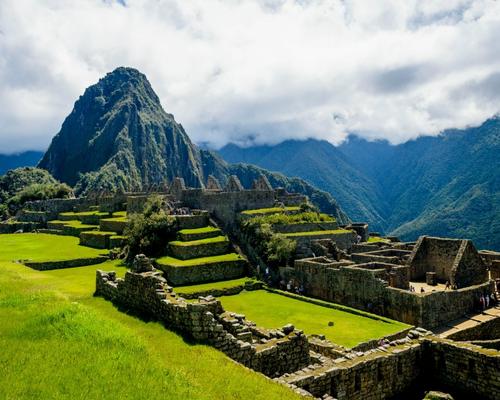 JANUARY
JANUARY
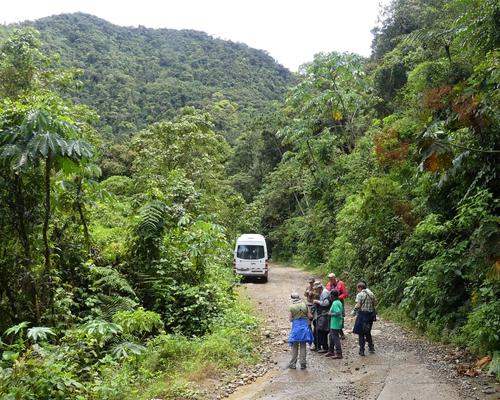 FEBUARY
FEBUARY
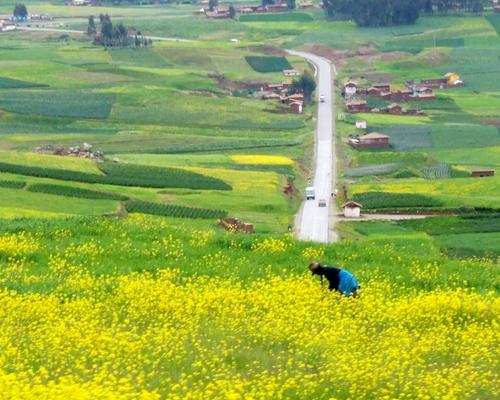 MARCH
MARCH
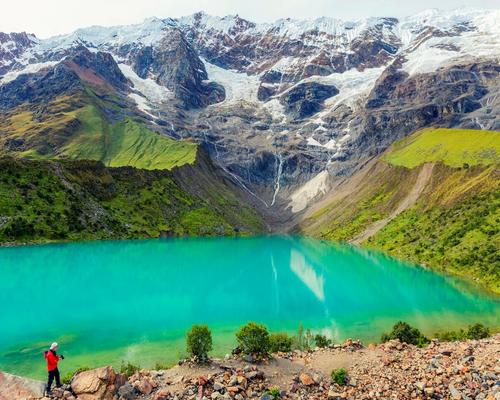 APRIL
APRIL
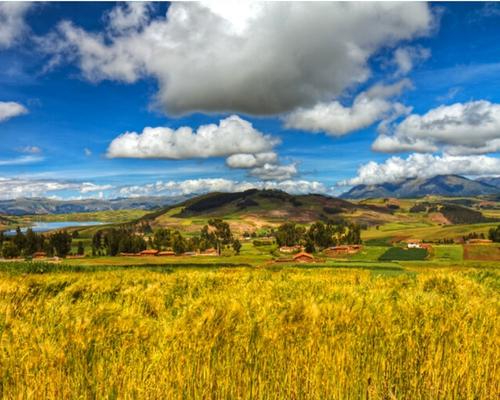 MAY
MAY
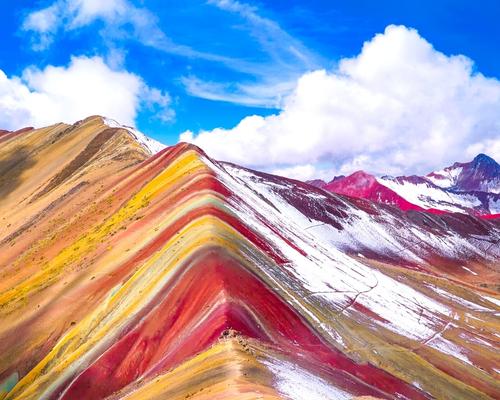 JUNE
JUNE
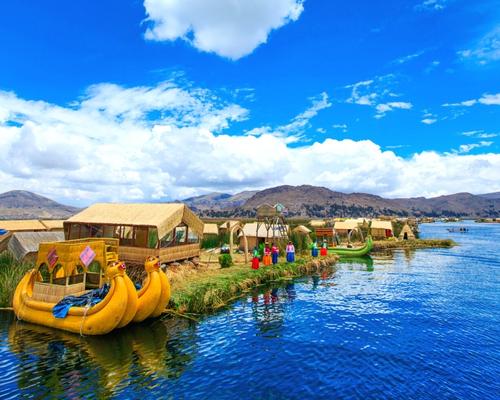 JULY
JULY
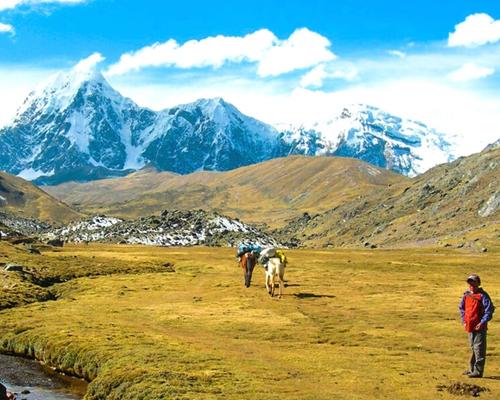 AUGUST
AUGUST
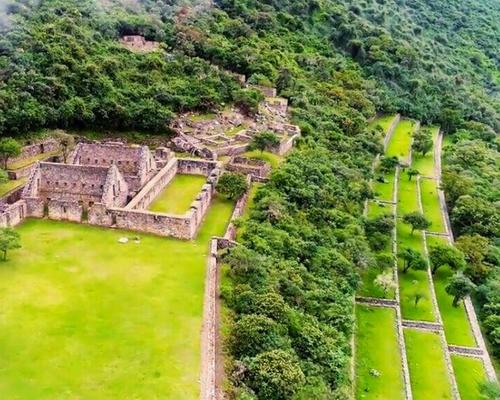 SEPTEMBER
SEPTEMBER
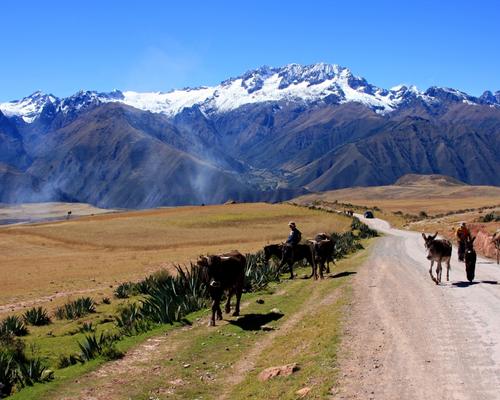 OCTOBER
OCTOBER
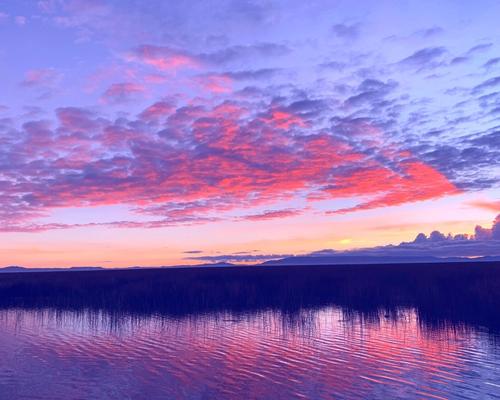 NOVEMBER
NOVEMBER
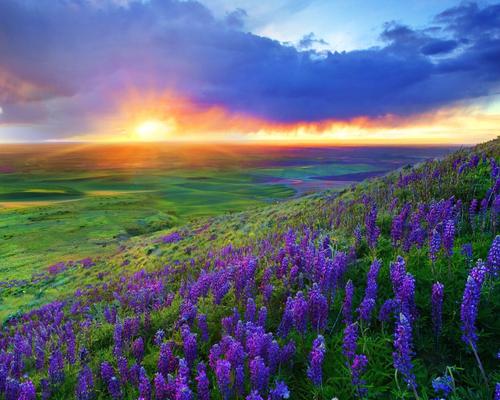 DECEMBER
DECEMBER
To book this tour, a minimum of $ 200 USD per person is required, the remaining balance will be paid upon arrival in Peru, at the Cusco office.
Any other additional information, please coordinate with your travel agent.
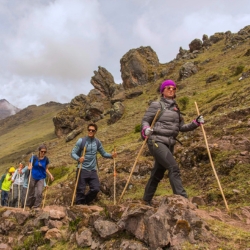
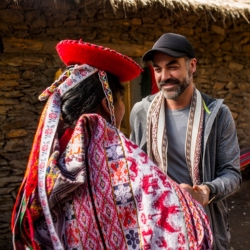
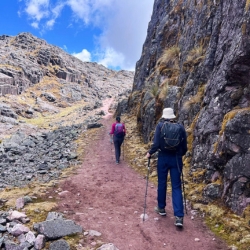
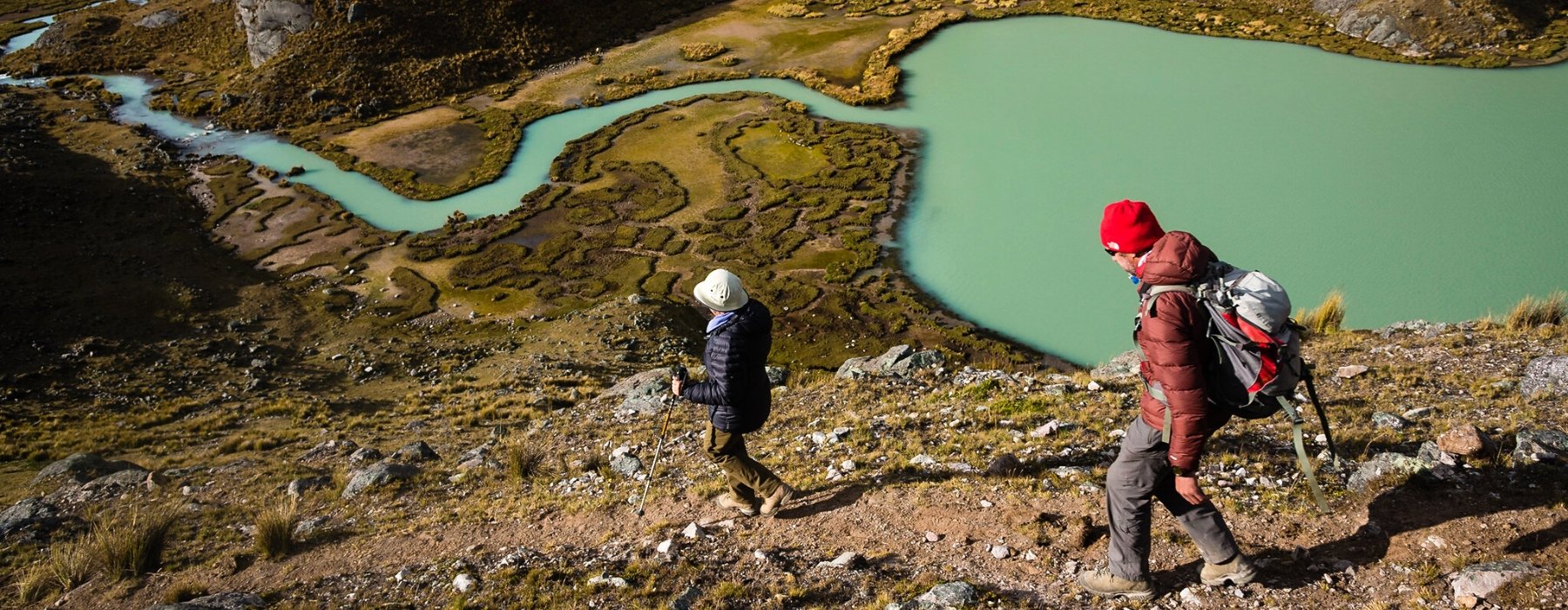
Nothing gets you closer to a country than walking through it, and we’ve got trips to suit walkers of all levels and interests.
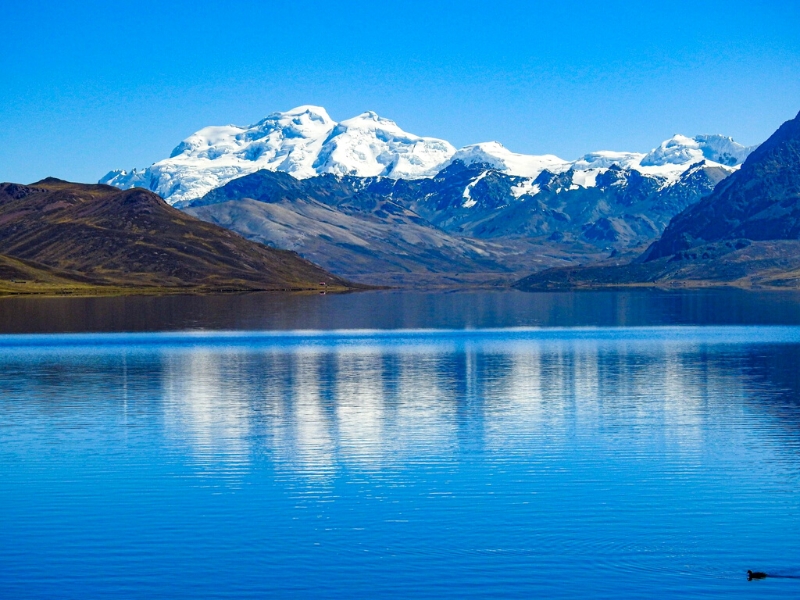
All our Walking trips are graded from ‘Easy’ through to ‘Challenging to Tough’. On our online trip itineraries you’ll find a chart showing the daily walk distances, timings and information on the route including the terrain, altitude. Generally, no specific training is needed but you might feel more comfortable if you’ve got out walking a few times in the lead-up to your trip.
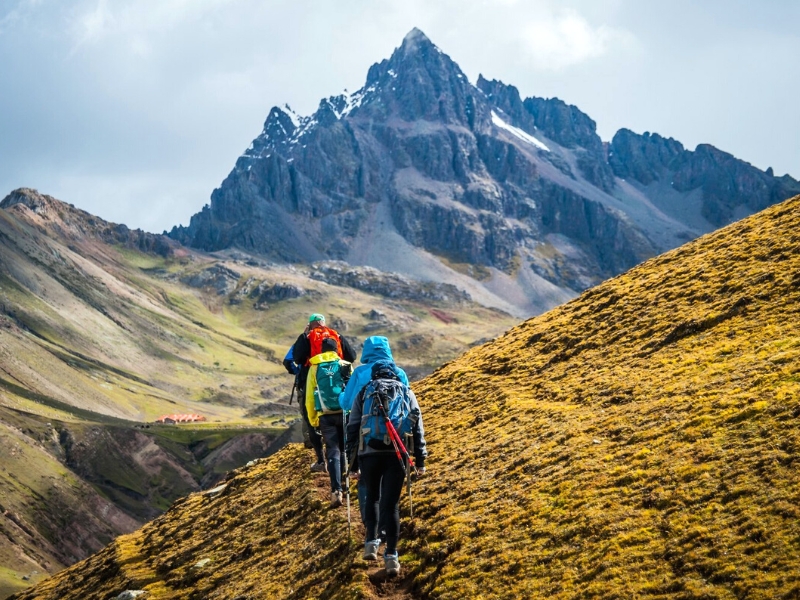
As with all our trips, every group is different but the ‘average’ group consists of roughly half couples and half solo travellers – all sharing a passion for exploring the world on foot. You’ll always have someone to keep you company along the route, but you don’t always have to walk together. Wherever possible your Andean Great Treks leader will allow everyone to walk at their own pace, regrouping regularly along the route.
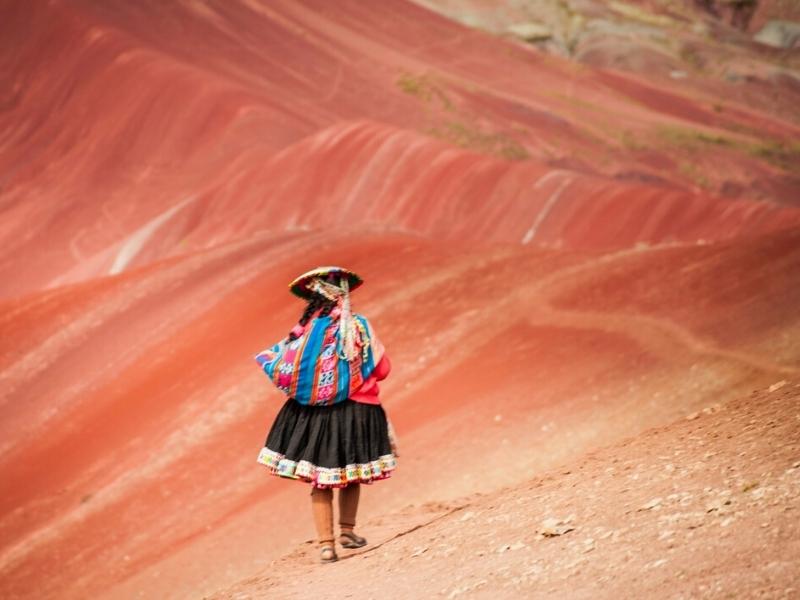
Mostly of our hikes in the mountains in Peru and Cusco like the classic Inca Trail to Machu Picchu, Ausangate Trek, Lares Trek, Ancascocha Trek, Salkantay Trek , involves an average of walking hours of 7-8 hours per day, this timing includes stops for taking photos, lunch, breaks for recovery the energy, and the most important we adapt to your walking pace. This relaxed style of trip involves to know all the attractions in greater depth.
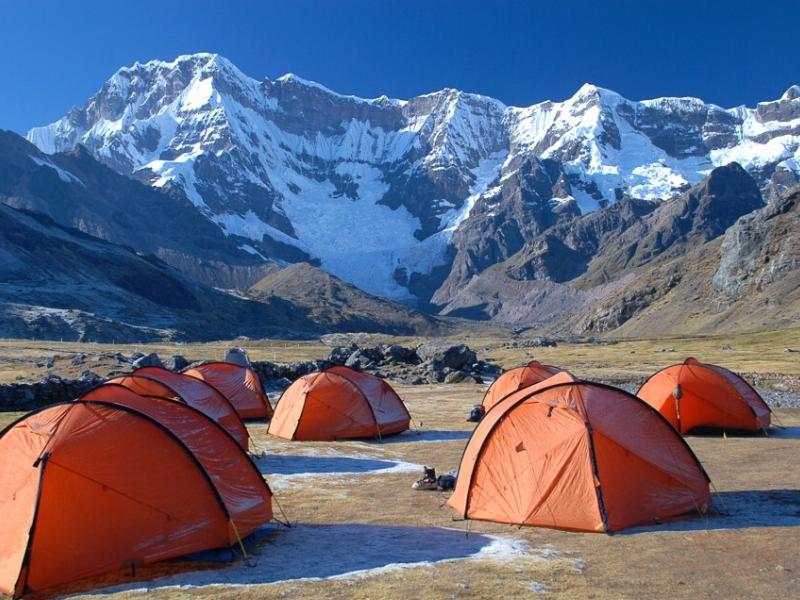
On nearly all our Walking trips, porters or mules will carry all the camping equimpent, so your main luggage will be transported for you. We recommend walk with a light rucksack, you will carry water, snacks, a camera, a small first aid kit and any extra clothing or sun protection. On more remote or challenging treks, additional guides are there to assist the leader tour guide and provide support to the group.
The acclimatization period is very important for our travelers to enjoy the experience. We suggest a minimum of 3 or 4 days of the previous stay in Cusco city, the Sacred Valley of the Incas or Machu Picchu. We recommend you check the acclimation programs we have prepared for you on our website.
The average height of our camps in the trekking circuits is 3,500 masl. In fact, one of the circuits where you sleep at the highest altitude is the Ausangate Trek, where you will have days to set up the tents at a height of 4,300 meters. Remember that Peru has snowy peaks that reach up to 6,700 masl.
From 3,000 meters above sea level, the symptoms of “altitude sickness” vary according to each person, and may even not occur. However, among the most common are a headache, dizziness, nausea, loss of appetite and insomnia. Therefore, upon arriving in the city of Cusco, located at 3,400 meters above sea level, we recommend our travelers to take a good rest, drink plenty of water, eat light meals and take slower walking. Also, it is necessary to avoid alcoholic beverages and cigarettes. The symptoms can be alleviated with high mountain medicines such as DIAMOX or similar products, but we suggest you consult with your doctor before the trip.
While on the trail, hikers will need to carry a daypack (camera equipment, water bottle, extra layers, rain gear, and other accessories you might need on the trail.) Horses and llamas will carry your duffle bag to the next camping site.
The company makes the greatest efforts to provide a safe and unforgettable experience, for this reason, the trekking guides are constantly communicated with the central office through satellite phones, ensuring the welfare of each passenger. Our guides are trained in rescue techniques and first aid in emergency outdoor, these courses are developed annually and have the standards of the wilderness first respond. At all times we have oxygen and first aid equipment. In case of any eventuality a medical director will answer our questions 24 hours a day. In addition to the animals who carry the luggage we have horses to help walkers tired or eager to ride. We recommend getting a travel insurance.
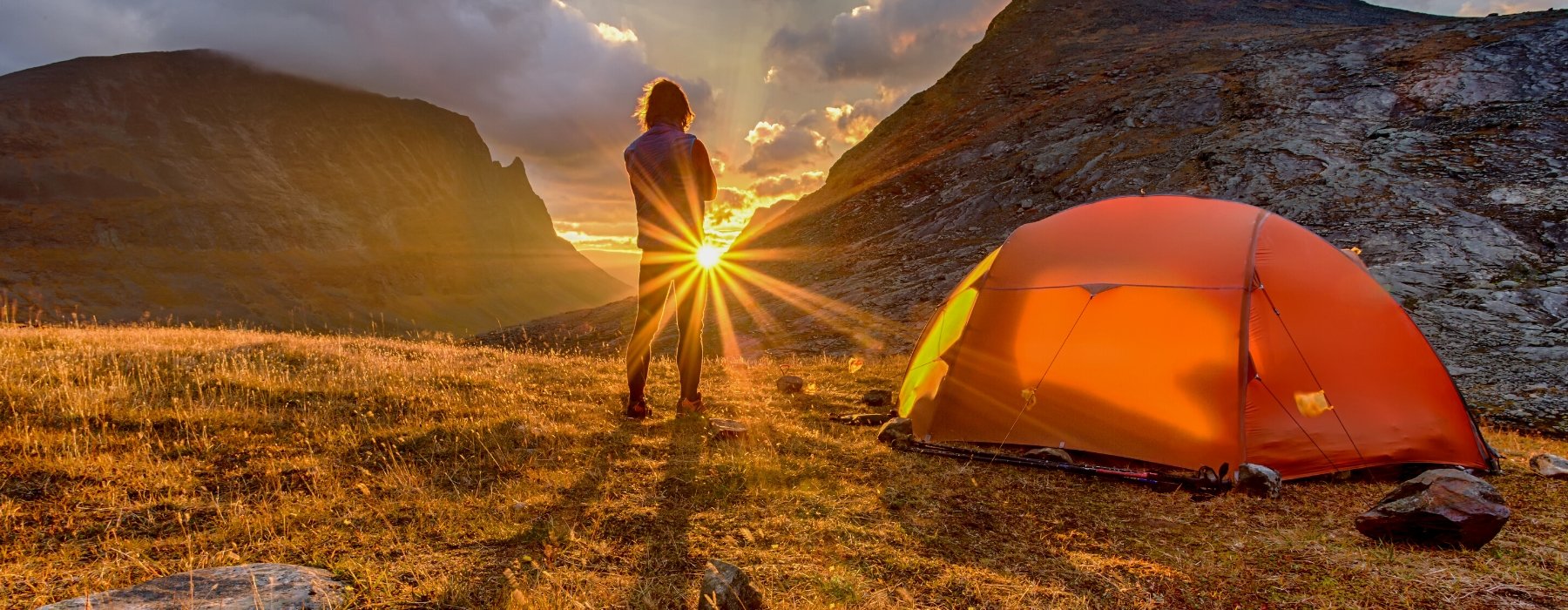
Every Andean Great Treks holiday has been thoughtfully planned and crafted by our specialists. They draw on their own extensive travel experience and the guidance and expertise of our local partners to create superb holidays. Our specialists are committed to making every aspect smooth and enjoyable; they genuinely want to ensure that the holidays they create leave you with wonderful lasting memories.
Every Andean Great Treks traveller is accompanied by an experienced tour guide, you will be immersed in Historic cities, ancient ruins and unfamiliar landscapes are all brought to life by our carefully selected local guides. They want to share their expertise and help you make your own discoveries too; their sole mission is to ensure you enjoy every moment.
Giving you the freedom to make your holiday even more memorable. We know how much our customers look forward to their holiday and we pride ourselves on the choice and flexibility that we offer to enhance every aspect of your experience. Whether it’s getting to the airport, upgrading your room or booking an additional excursion, we can help.
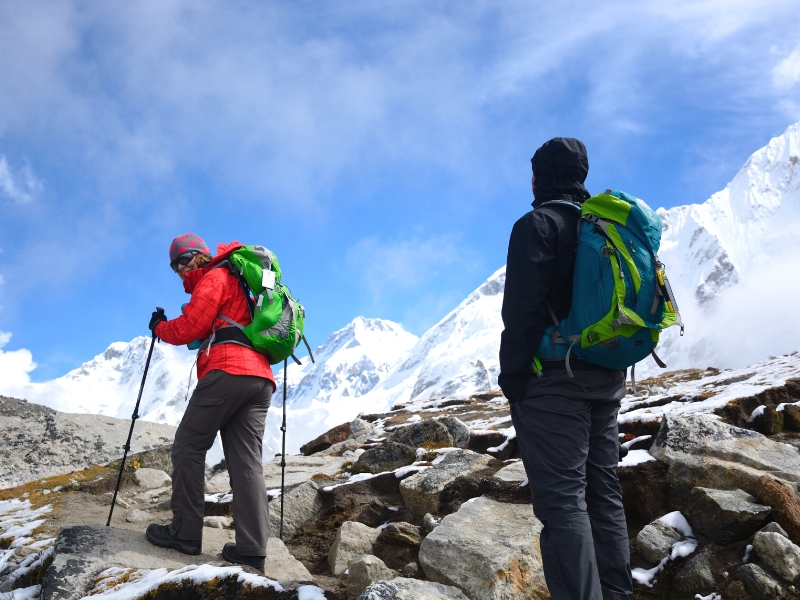
Our guides are the stars of the show; it is their unrivalled knowledge, passion and expertise that will transform your tour experience from good to truly extraordinary!
Because the have grown up in the area and know it like the back of their hand, so they can help you experience whichever aspects most interest you. They’re passionate about sharing their corner of the world with you, and as you explore together, they’ll open your eyes to the intricate details, provide background to enhance your understanding of what you’re seeing, and share stories that will bring everything to life.
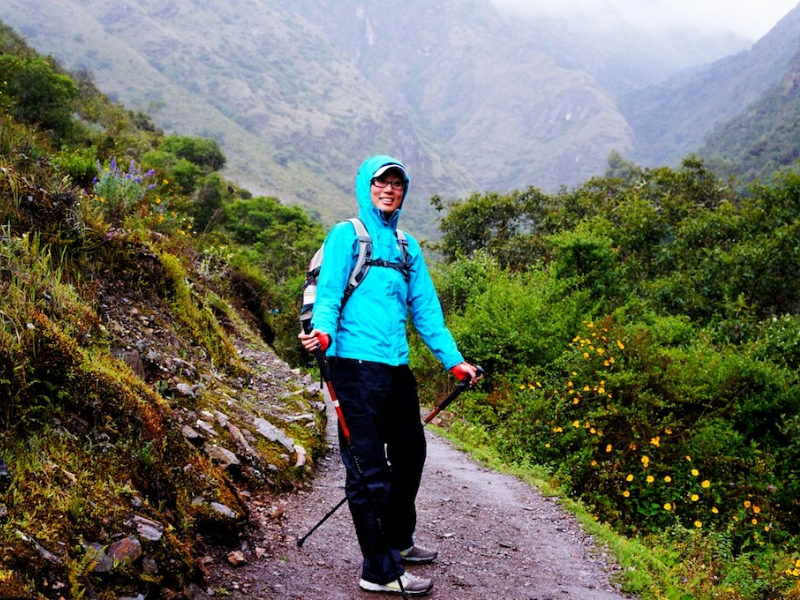
“Your inspiration for a trip can be a single word or a highly evolved outline, but it’s the conversations we have that help us understand the experience you’re looking for. Meanwhile, I’m looking back on the time I spent at the destination.
‘The great thing about working with a specialist at Andean Great Treks is how they take your complete jumble of ideas and turn them into something absolutely spectacular.’
As you begin to share your ideas with your specialist, it will connect them immediately back to a time in their own travels. Conjuring a picture of the rest time they made that same discovery, reminding them how it felt.
Your specialist understands that, when the journey is right, it has the power to excite your emotions in the most profound ways after all, that was the effect on them.
They carry a treasure box of moments, captured over many journeys, into every suggestion they’ll share with you, as they ask you how you want to feel on your trip.
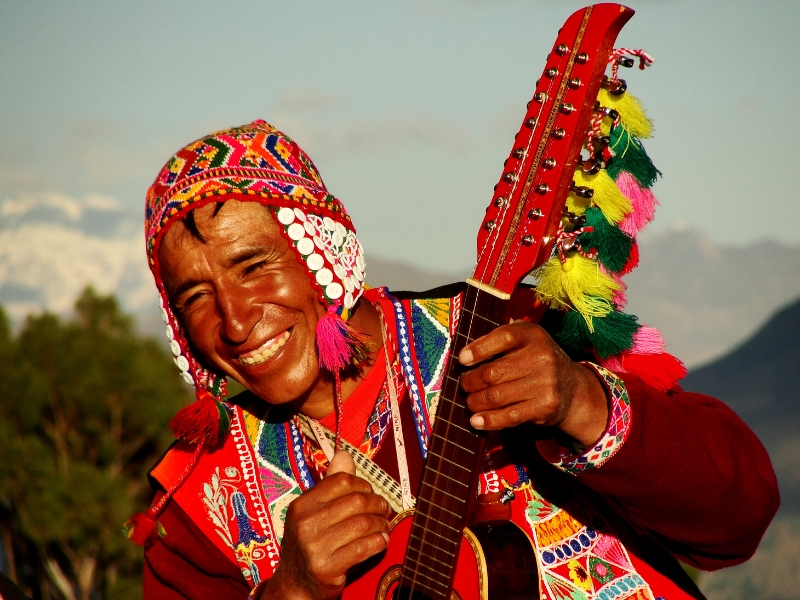
EXPERIENCES THAT CALL TO YOU
It’s what you do in a destination that helps bring it to life. It’s why we strive to choose experiences that help you connect to a place, absorbing a little of its complex character. Wherever your passions lie, we’ll recommend experiences that speak to you, and we’ll recommend the guide or local expert who’s most qualified to help you explore. Packing your holiday full of special experiences means some early starts and long days, but you can be sure that you’ll return home with many incredible memories! Read our Tours and check the Physical Ratings to see if the pace and activity levels are right for you.
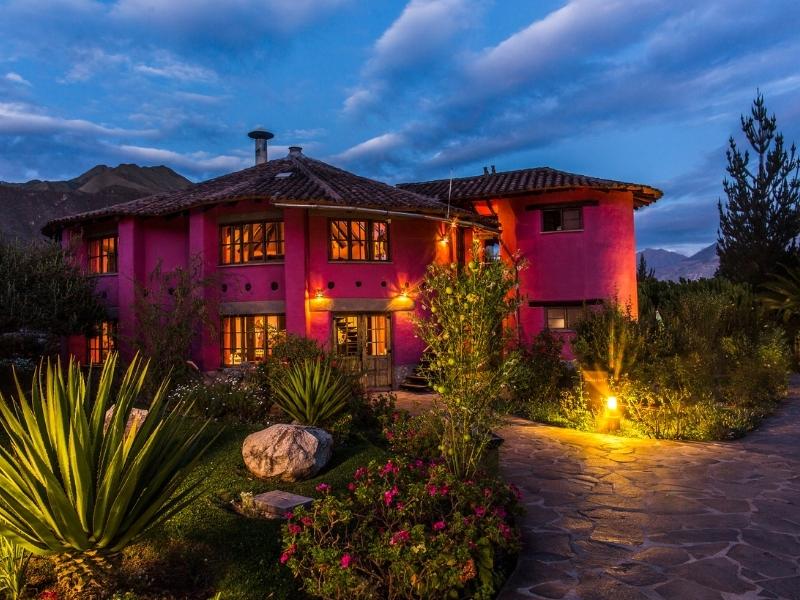
STAYS WITH DIFFERENCE
We know that where you stay is a cherished part of your travels. So, we go to great lengths to find places to stay that exceed expectations, or go above and beyond the ordinary, whether in their character, hospitality, or location. Over the years, we’ve discovered the very best properties, trying and testing them, so we can choose the right one for you. We’ve nourished long-standing relationships with these establishments and the people who founded them, and we’ve stayed there many times often, we’ll even know which rooms have the best views (and reserve them for you).
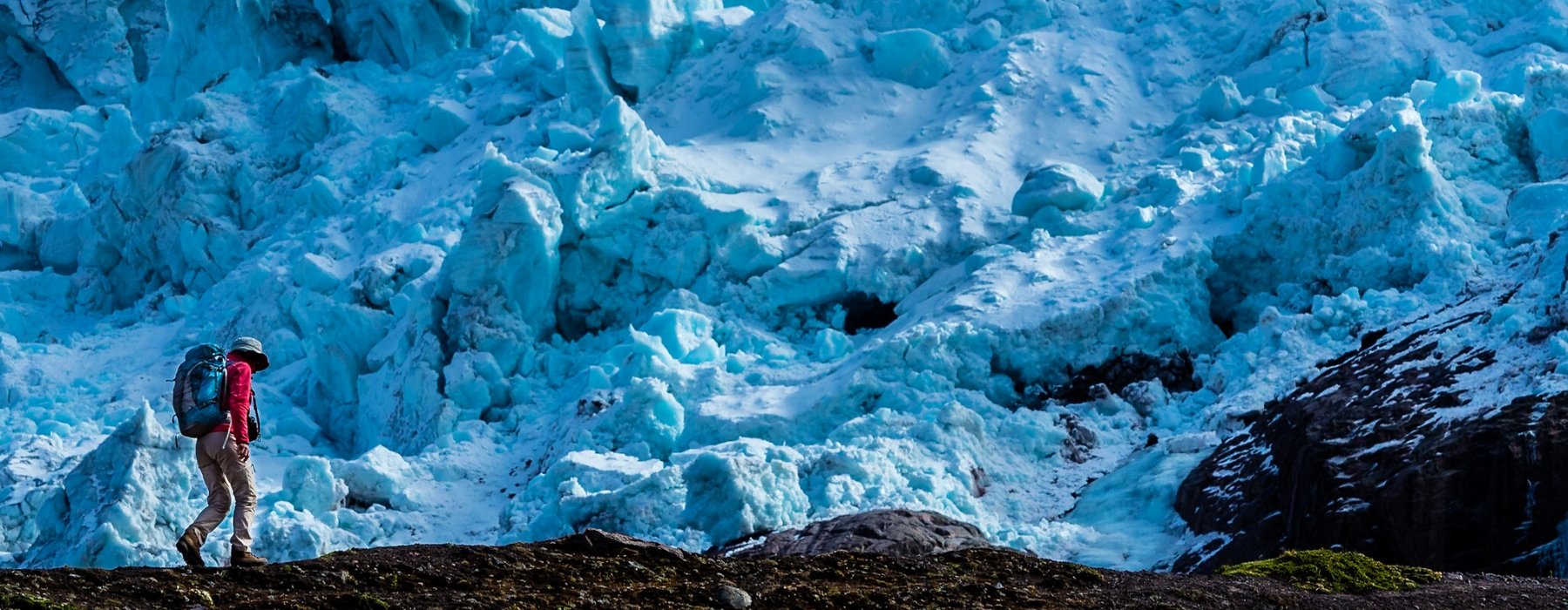
Our style of travel — authentic, thoughtful, and focused on building meaningful connections to the people and places you visit — is inherently respectful and considerate of the destinations we love. We design each aspect of your trip exactly as you want it, which includes its sustainability. That might mean choosing a train journey instead of a flight, staying at eco-friendly wildlife lodges, or opting for experiences that give back to the communities you’re visiting. The choice is yours.
Responsible travel has always been at the heart of what we do. First and foremost, because it gives you the best experience, but, also because it helps to preserve the communities and landscapes you visit. This isn’t new for us we collaborated with local communities and outside experts so we can grow to be better ambassadors.
The most authentic and interesting experiences often directly benefit the local people. We prefer to buy local products that are produced in the organic farms of the Sacred Valley, we also have alliances with local artisan organizations who provide us with souvenir items for our clients, your money directly benefits the local economy.
Our style of travel — authentic, thoughtful, and focused on building meaningful connections to the people and places you visit — is inherently respectful and considerate of the destinations we love. We design each aspect of your trip exactly as you want it, which includes its sustainability. That might mean choosing a train journey instead of a flight, staying at eco-friendly wildlife lodges, or opting for experiences that give back to the communities you’re visiting. The choice is yours.
Responsible travel has always been at the heart of what we do. First and foremost, because it gives you the best experience, but, also because it helps to preserve the communities and landscapes you visit. This isn’t new for us we collaborated with local communities and outside experts so we can grow to be better ambassadors.
The most authentic and interesting experiences often directly benefit the local people. We prefer to buy local products that are produced in the organic farms of the Sacred Valley, we also have alliances with local artisan organizations who provide us with souvenir items for our clients, your money directly benefits the local economy.
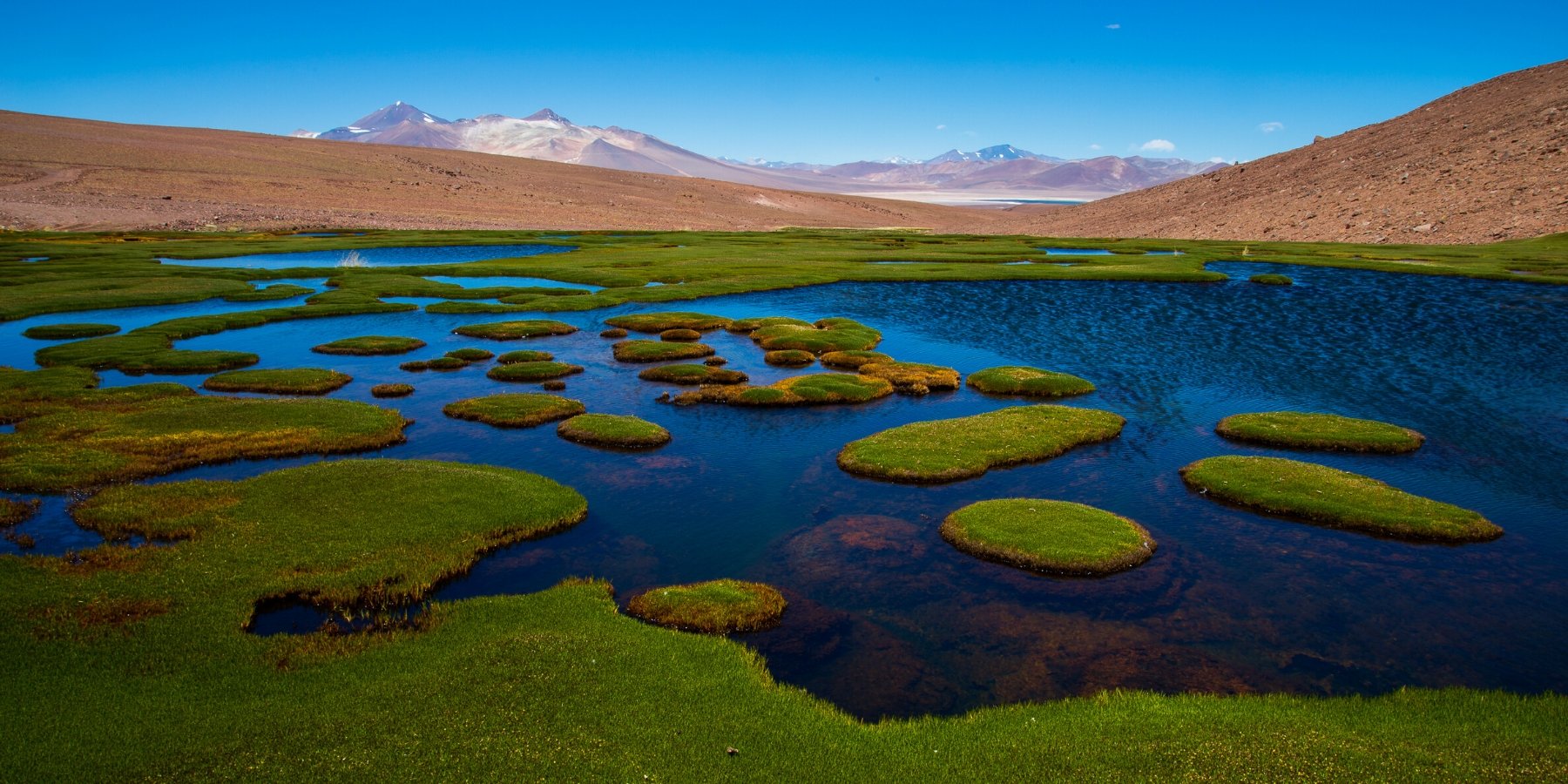
‘There’s a saying: we don’t inherit the Earth from our ancestors, we borrow it from our children. When we show you our country, this philosophy guides everything we do. It’s our responsibility to preserve the environment and wildlife, and support communities. That means using slower modes of transport, like cycling, employing local people, and working with communities who’ll benefit directly from your visit. This also gives you the best, most authentic impression of the places we want to share with you.
We prefer to buy local products in ecological bags, to avoid the use of plastic bags, likewise we teach the use of soaps and ecological products in each tour that we organize. We also work on reforestation projects with local communities who take care of landscape resources such as communal reserves, national parks.
‘There’s a saying: we don’t inherit the Earth from our ancestors, we borrow it from our children. When we show you our country, this philosophy guides everything we do. It’s our responsibility to preserve the environment and wildlife, and support communities. That means using slower modes of transport, like cycling, employing local people, and working with communities who’ll benefit directly from your visit. This also gives you the best, most authentic impression of the places we want to share with you.
We prefer to buy local products in ecological bags, to avoid the use of plastic bags, likewise we teach the use of soaps and ecological products in each tour that we organize. We also work on reforestation projects with local communities who take care of landscape resources such as communal reserves, national parks.
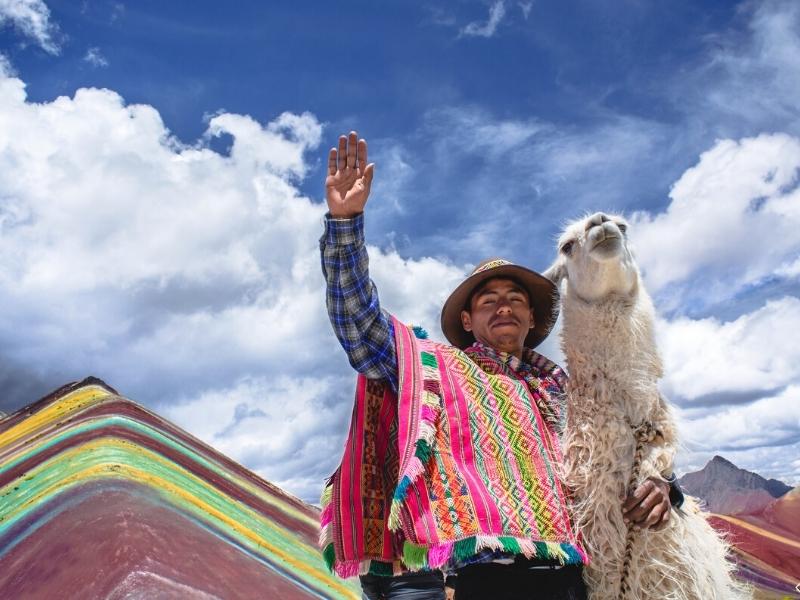
The Ausangate Trek is renowned for its otherworldly natural scenery. It’s considered by many to be one of the world’s best high-altitude treks, the trek takes hikers over several high passes, into low alpine valleys, and through traditional Peruvian villages.
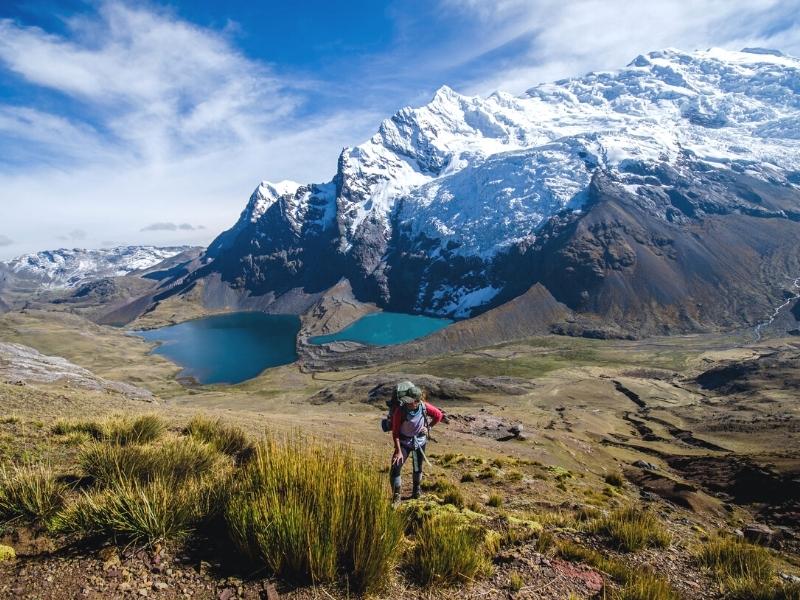
The Ausangate Trek is one of the hiking circuits, most incredible for the beauty of its landscapes, in this mountain adventure you will enjoy unique scenarios, such as lakes of different colors (blue, green, turquoise, red), the mythical mountain of rainbows and ancient Andean cultures, who are the true heirs of the Incas, many still celebrate their ancestral rites.
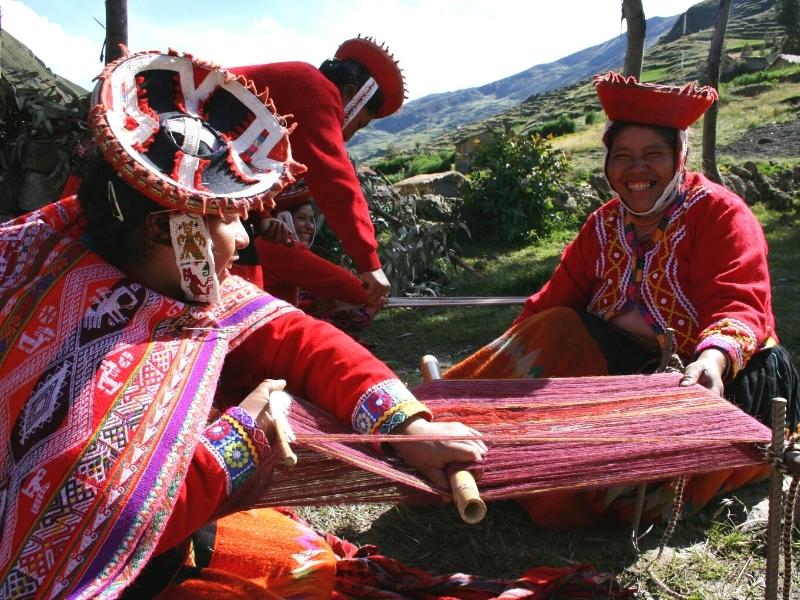
Explore the Lares Trek to Machu Picchu, this trip takes you to the heart of the Andes where few tourist have ventured, you will enjoy the Andean traditions and original indigenous villages, who are still keeping the incas traditions, imposing glaciers, green lakes, waterfalls, llamas and alpacas.